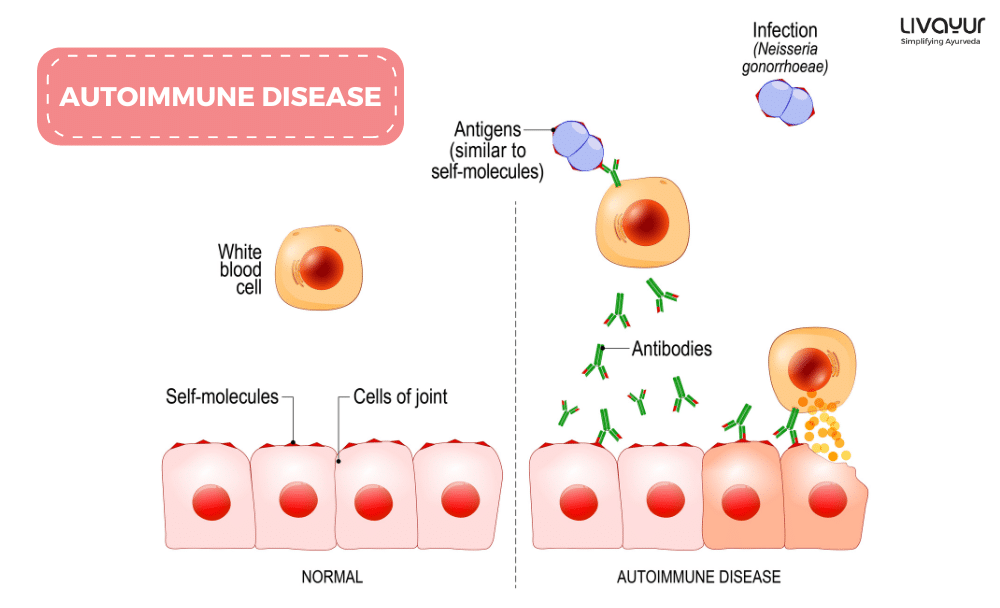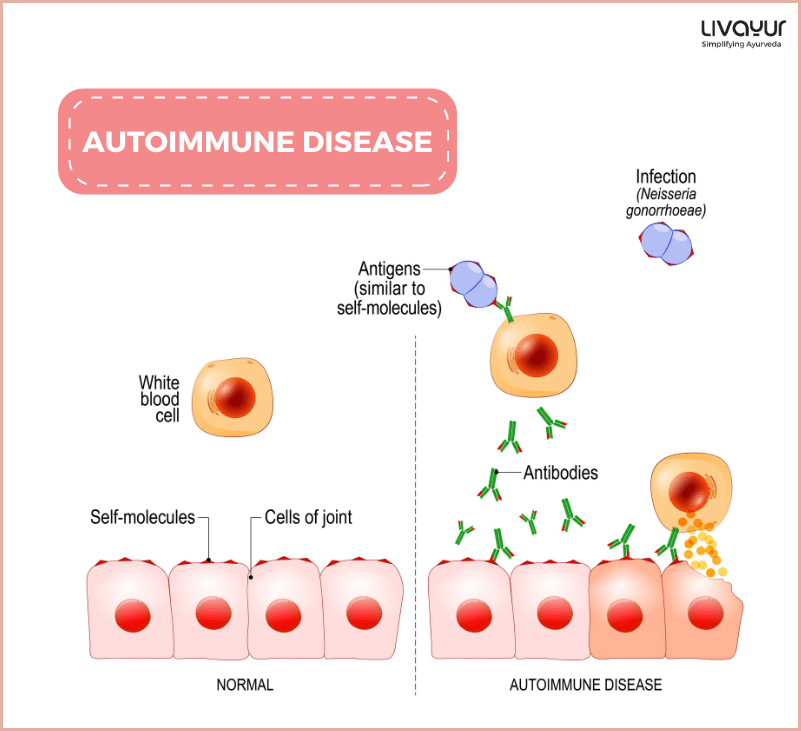This article is reviewed by an expert

Autoimmune diseases are complex and multifaceted conditions that have gained significant attention in the medical field. In these disorders, the immune system, which is designed to protect the body from harmful invaders, mistakenly targets its own healthy cells and tissues. This misguided immune response can result in chronic inflammation, tissue damage, and a wide array of symptoms. With over 80 known autoimmune diseases affecting different organs and systems, understanding the causes, symptoms, types, treatment, and prevention of these conditions becomes crucial. In this comprehensive article, we will delve into the intricate world of autoimmune diseases, exploring them through the lens of Ayurveda, an ancient holistic healing system that emphasizes balance and harmony in the body. By shedding light on the Ayurvedic perspective, we aim to provide valuable insights into autoimmune diseases and empower individuals to make informed decisions about their health.
Causes of Autoimmune Diseases [1, 2]
The exact causes of autoimmune diseases are not fully understood. However, several factors may contribute to their development, including:
- Genetic Factors: Certain genetic variations can increase the susceptibility to autoimmune diseases.
- Environmental Triggers: Exposure to certain environmental factors, such as infections, toxins, and medications, may trigger or exacerbate autoimmune responses.
- Hormonal Imbalance: Hormonal changes and imbalances, particularly in women, can influence the development of autoimmune diseases.
Symptoms of Autoimmune Diseases [1, 3, 4]
The symptoms of autoimmune diseases vary depending on the specific condition and the affected organs. However, some common symptoms include:
- Fatigue and Weakness: Persistent fatigue and weakness are common symptoms of autoimmune diseases.
- Joint Pain and Swelling: Many autoimmune diseases cause joint pain, swelling, and stiffness.
- Skin Problems: Skin-related symptoms such as rashes, redness, and ulcers may occur in certain autoimmune diseases.
- Digestive Issues: Autoimmune diseases can affect the digestive system, leading to symptoms such as abdominal pain, diarrhoea, and bloating.
Types of Autoimmune Diseases [3, 4]
There are over 80 known autoimmune diseases, each affecting different organs or systems. Some examples include:
- Rheumatoid Arthritis: An autoimmune disease primarily affecting the joints, causing pain, swelling, and stiffness [3].
- Systemic Lupus Erythematosus (SLE): A chronic autoimmune disease that can affect multiple organs, including the skin, joints, kidneys, and heart [3].
- Hashimoto’s Thyroiditis: An autoimmune condition where the immune system attacks the thyroid gland, leading to an underactive thyroid [4].
- Type 1 Diabetes: An autoimmune disease in which the immune system destroys the insulin-producing cells in the pancreas, resulting in high blood sugar levels [3].

Treatment of Autoimmune Diseases
While there is no cure for autoimmune diseases, treatment focuses on managing symptoms, reducing inflammation, and suppressing the immune response. Ayurveda, the ancient Indian system of medicine, offers holistic approaches to managing autoimmune diseases, including:
- Ayurvedic Diet: Following an anti-inflammatory diet rich in fresh fruits, vegetables, whole grains, and spices can help support the immune system and reduce inflammation.
- Herbal Remedies: Certain Ayurvedic herbs, such as Ashwagandha, Turmeric, and Guduchi, have immune-modulating properties and may help manage autoimmune conditions.
- Lifestyle Modifications: Stress management techniques, regular exercise, and adequate sleep can support overall well-being and improve immune function.
Prevention of Autoimmune Diseases [5, 6, 7]
While it may not be possible to prevent all autoimmune diseases, adopting a healthy lifestyle can help reduce the risk and improve overall health. Here are some preventive measures:
- Maintain a Balanced Diet: Eat a nutrient-rich, anti-inflammatory diet to support immune function and reduce the risk of autoimmune diseases [5].
- Manage Stress: Chronic stress can negatively impact the immune system. Practice stress-management techniques such as meditation, yoga, and deep breathing exercises [6].
- Avoid Environmental Triggers: Minimise exposure to environmental toxins, chemicals, and pollutants that may trigger autoimmune responses.
- Regular Exercise: Engage in regular physical activity to support immune function, reduce inflammation, and maintain a healthy weight [7].
Frequently Asked Questions (FAQs)
What is an autoimmune disease?
Autoimmune diseases are conditions where the immune system mistakenly attacks healthy cells and tissues in the body.
Can autoimmune diseases be cured?
Currently, there is no known cure for autoimmune diseases. However, various treatments can help manage symptoms and improve quality of life.
How can I prevent autoimmune diseases?
While not all autoimmune diseases can be prevented, adopting a healthy lifestyle, including a balanced diet, stress management, and regular exercise, can help reduce the risk.
What are some examples of autoimmune diseases?
Examples of autoimmune diseases include rheumatoid arthritis, systemic lupus erythematosus (SLE), Hashimoto’s thyroiditis, and type 1 diabetes.
Is there an Ayurvedic approach to managing autoimmune diseases?
Yes, Ayurveda offers holistic approaches to managing autoimmune diseases, including dietary modifications, herbal remedies, and lifestyle adjustments.
Conclusion
In conclusion, autoimmune diseases are complex conditions that involve the immune system mistakenly attacking the body’s own tissues. While the causes and cure for autoimmune diseases are not yet fully understood, various treatment options, including Ayurvedic approaches, can help manage symptoms and improve quality of life. By adopting a healthy lifestyle and seeking appropriate medical guidance, individuals can reduce the risk of autoimmune diseases and promote overall well-being.
Disclaimer: The information provided here is for general information and not meant to substitute any medical advice. Please consult your doctor for appropriate medical consultation.
References:
- https://www.niehs.nih.gov/health/topics/conditions/autoimmune/index.cfm
- https://www.ncbi.nlm.nih.gov/pmc/articles/PMC6501433/
- https://www.hindawi.com/journals/jir/2018/5798103/
- A. Arduc, S. Isık, S. Allusoglu et al., “Evaluation of hearing functions in patients with euthyroid Hashimoto’s thyroiditis,” Endocrine, vol. 50, no. 3, pp. 708–714, 2015.
- https://academic.oup.com/aje/article/183/5/403/2196709
- https://www.sciencedirect.com/science/article/pii/S156899720900192X
- https://www.nature.com/articles/nrgastro.2015.136%3E

























